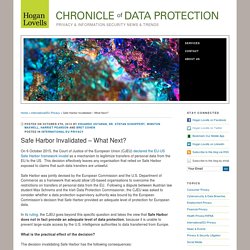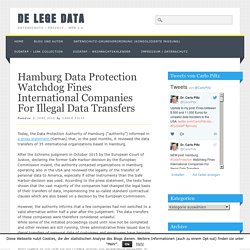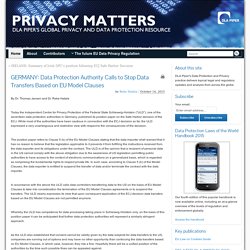

Model Clause contract. Safe Harbor Invalidated – What Next? On 6 October 2015, the Court of Justice of the European Union (CJEU) declared the EU-US Safe Harbor framework invalid as a mechanism to legitimize transfers of personal data from the EU to the US.

This decision effectively leaves any organisation that relied on Safe Harbor exposed to claims that such data transfers are unlawful. Safe Harbor was jointly devised by the European Commission and the U.S. Hamburg Data Protection Watchdog Fines International Companies For Illegal Data Transfers. Today, the Data Protection Authority of Hamburg (“authority”) informed in a press statement (German) that, in the past months, it reviewed the data transfers of 35 international organizations based in Hamburg.

After the Schrems judgment in October 2015 by the European Court of Justice, declaring the former Safe Harbor-decision by the European Commission invalid, the authority contacted organizations in Hamburg operating also in the USA and reviewed the legality of the transfer of personal data to America, especially if other instruments than the Safe Harbor-decision was used. According to the press statement, the tests have shown that the vast majority of the companies had changed the legal basis of their transfers of data, implementing the so-called standard contractual clauses which are also based on a decision by the European Commission. However, the authority informs that a few companies had not switched to a valid alternative within half a year after the judgement. Irish privacy watchdog refers Facebook's U.S. data transfers to EU court.
Opinion of Prof. Lokke Moerel of Morrison & Foerster on the impact of the ECJ Safe Harbor Decision on the alternative transfer mechanisms: “Schrems decision has no impact on the lawfulness and viability of the alternative mechanisms for data transfers” Following the judgement of the European Court of Justice in Schrems v Data Protection Commissioner invalidating the Safe Harbor for data transfers to the U.S., companies rely on alternative basis for their data transfer to the U.S., such as Standard Contractual Clauses and Binding Corporate Rules.

The Working Party 29 is scheduled to convene for a plenary meeting at 2 and 3 February to discuss consequences of the Schrems judgment, which must inevitably include the impact on the alternative data transfer mechanisms, and will decide whether companies can continue relying on Standard Contractual Clauses and Binding Corporate Rules. If the alternative mechanism would be invalidated, companies are left with no alternative mechanisms to legalize their transfers to the U.S. To assist the Working Party 29 in this assessment, Prof. Will We See a "Safe Harbor 2.0" Soon? Editor's Note: Schrems will take part in the breakout session, “Safe Harbor Postmortem: Schrems Reflects,” during the IAPP Europe Data Protection Congress in Brussels.

He’ll be joined by European Parliament Senior Policy Advisor Ralf Bendrath, American Express Global Privacy Officer Kasey Chappelle, Hogan Lovells Partner Eduardo Ustaran, CIPP/E, and the IAPP’s Omer Tene. At first, I expected the European Commission to patch the current Safe Harbor within weeks or months. This is also the approach the European Commission is currently working on. After a second review of the European Court of Justice's (ECJ) judgment, it will be very hard to come up with a solution that addresses all problems identified by the Court, given the U.S. position. EU Data Transfer Mechanisms May Keep Tumbling - Risk & Compliance. Safe Harbor 2 Registration.
Contact (844) 681-8100 Technical Solutions to Safe Harbor Challenges On Demand Webinar If you do business, have vendors, or have staff in Europe — you need to take action now.

In our first webinar in this series, we looked at how the Safe Harbor framework has helped U.S. companies deal with European Union data privacy and protection mandates and what some likely changes will be now that Europe’s highest court ruled the existing Safe Harbor laws invalid. Further approach in Germany. GERMANY: Data Protection Authority Calls to Stop Data Transfers Based on EU Model Clauses. By Dr.

Thomas Jansen and Dr. Reka Hatala Today the Independent Centre for Privacy Protection of the Federal State Schleswig-Holstein (“ULD”), one of the seventeen data protection authorities in Germany, published its position paper on the Safe Harbor decision of the ECJ. While most of the authorities have been cautious in connection with the ECJ decision so far, the ULD expressed a very unambiguous and restrictive view with respect to the consequences of the decision. The position paper refers to Clause 5 (b) of the EU Model Clauses stating that the data importer shall warrant that it has no reason to believe that the legislation applicable to it prevents it from fulfilling the instructions received from the data exporter and its obligations under the contract.
Europe-v-facebook.org. First Thoughts on Decision C-362/14 by Max Schrems In this first response I would like to comment on what seems to me the most relevant issues after the invalidation of “Safe Harbor” by the CJEU.

All texts are free to use (CC / by-nx / attribution, non-commercial). This was typed with limited time - which is why hints on typos and alike via email are very much appreciated... ;) Safe Harbor Ruling Leaves Data Center Operators in Ambiguity. Europe’s annulment of the framework that made it easy for companies to transfer data between data centers in Europe and the US while staying within the limits of European privacy laws has caused a lot of uncertainty for businesses that operate data centers on both sides of the Atlantic.

US cloud services giants have taken steps to make sure they continue to provide services legally using means other than the Safe Harbor framework, but actual consequences of the European Court of Justice ruling earlier this week remain unclear. David Snead, an attorney and co-founder of the Internet Infrastructure Coalition, a US advocacy group whose members include Google, Amazon, and Equinix, among many others, said there were currently two “schools of thought” on the subject. Comments by Stewart Room PwC. M.computing.co. On 5 June 2013, Edward Snowden initiated a cascading exposé that would open the eyes of the world to the surreptitious and wholesale surveillance of digital communications by the NSA in the US and GCHQ in the UK.

The revelations laid bare the activities and programmes that have been intercepting and analysing the vast majority of internet and phone communications at a global level for many years, including programmes that obligated the world's largest technology corporations to provide access to their networks and data centres through the use of secret court orders that not only forced these corporations to hand over data about their users en masse but also prevented them from disclosing anything about these orders.
The legal underpinnings of US surveillance. Alexander Hanff. Comments by Eduardo Ustaran HL. Safe Harbor Ruling Leaves Data Center Operators in Ambiguity. Transfer of personal data to US may constitute an offence. Details Parent Category: Finland Category: Domestic 08 Oct 2015 A decision by the European Court of Justice to beef up data protection can result in the criminalisation of the transfer of personal data to the United States.

“The decision by the court of justice establishes a backdrop for there being a genuine risk of meeting the elements of an offence,” estimates Jussi Tapani, a professor of criminal law at the University of Turku. Microsoft and model clauses - where the cloud stands after Safe Harbor. What will you actually have to do if Safe Harbor falls? « Privacy and information law blog. “Hell hath no fury like a woman scorned” or so goes the saying. Nor would it seem, hath it a fury like a student scorned.
After many months of litigating, Austrian student-turned-privacy-activist Max Schrems tweeted today that the European Court of Justice would deliver its final judgment on the future of Safe Harbor on 6th October at 9.30am CET. If true (and Schrems tweeted a picture of the notification of judgment, so there’s every reason to believe it is), the timing of this judgment is surprising coming, as it does, just a couple of weeks after Advocate General Bot’s damning opinion that the Safe Harbor framework is invalid.